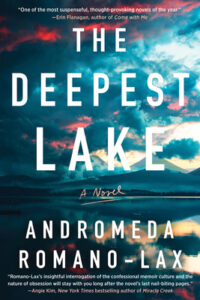Standalone
 This was an unexpected read. Set in Guatemala on the shores of Lake Atitlán, the story follows the drowning death of young Jules. The way into the story is through her mother, Rose’s, unfathomable grief at the loss of her daughter. The lake is deeper than Lake Michigan (to put it in context) and Jules’ body has not been found. Her father went first to search, and with his military training and willingness to work with local law enforcement he gets a certain number of facts, but Rose wants to somehow live into the place where her daughter was last seen and feel her way into a solution. It’s almost a perfect split of the stereotypical male and female ways of approaching a problem.
This was an unexpected read. Set in Guatemala on the shores of Lake Atitlán, the story follows the drowning death of young Jules. The way into the story is through her mother, Rose’s, unfathomable grief at the loss of her daughter. The lake is deeper than Lake Michigan (to put it in context) and Jules’ body has not been found. Her father went first to search, and with his military training and willingness to work with local law enforcement he gets a certain number of facts, but Rose wants to somehow live into the place where her daughter was last seen and feel her way into a solution. It’s almost a perfect split of the stereotypical male and female ways of approaching a problem.
Jules was working for her writing idol at her exclusive Guatemalan writing retreat. Women pay $6000 for a 10 day stay of workshopping their possible future memoirs with the writer, Eva, whose most famous book was about losing a much longed for child borne in late middle age. Rose signs up for a workshop, using her maiden name – she’s been emailing questions to Eva with little response – and assumes the mantle of an aspiring memoirist. The women in her group come from many backgrounds and many of them are traumatized in some way, seeing writing a memoir as a way to move through their trauma and hopefully, past it.
Eva turns out to be imperious, fascinating, charismatic and a bit dangerous. Her personality infects the story like a tea bag in a mug of hot water – it spreads and darkens throughout the book. The narrative also goes back to Jules’ time with Eva. She’d been hired as a sort of personal assistant, and though she’d hoped to find a writing mentor, she finds instead a capricious boss who is affectionate one moment and dismissive the next. Eva’s personality is really the crux of the mystery.
Rose, desperate for clues, tries to ask around as best she can, and luckily she’s fluent in Spanish. Like Miss Marple before her, she’s a somewhat overlooked woman of a certain age who can question a cook or a maid and not really be noticed. She’s having a hard time finding employees who knew Jules, however, and Eva herself has insisted Jules was fired as she has too many distractions outside of work.
The setting, like all Soho Crime novels, is as much a character as anything else in the novel, with the lake, beautiful and mysterious, sitting alongside all of the action. Jules met her death in the lake, and her mother is both fascinated and repelled by it. Both mother and daughter disliked/dislike the water. The village is a character as well, as Rose makes her forays to town from the exclusive camp.
The writer’s workshop is part of the narrative, and it sounds like a painful and unpleasant experience, but the love for Eva on the part of the would be writers is cult-like. Rose, not part of the cult, perceives something off from the start. The only clues she has are Jules’s beat up, much underlined copy of Eva’s memoir, found in the backpack of a German hiker, and a mysterious drug dealer who is presently in jail. There’s a twist in the story which I had figured out but is still very effective. I wasn’t won over by the ending of the novel, but it wasn’t unsatisfying from a mystery point of view, it was unsatisfying from an emotional one.
Romano-Lax has certainly created memorable and resonant characters, and I couldn’t stop turning the pages. The story is simple and complex at the same time. It’s a book I won’t soon forget, even as I revise parts of it in my mind. — Robin Agnew